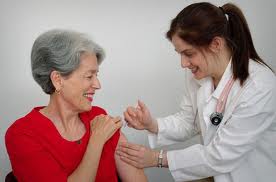Health checklist for women above 40 years:
Understanding Health Needs
As women grow and mature, their health
needs also change according to their age. Therefore, it is very important to
maintain a healthy lifestyle.
Women's health is an
issue which has been taken up by many feminists, especially where reproductive health is concerned. Even if you feel good
and healthy, still it is important to have regular health checkups. Following
are some specific tests that women above 40 should have in order to avoid
future problems as health is wealth.
1)
Bone mineral density test:
Ø It
is performed to check the strength of the bone and to check the risk of
osteoporosis.
Ø Osteoporosis
is a problem in which there is loss of bone
Ø It
usually occurs at the age of 40 or above. Bones become fragile.
Ø The
lifetime risk of osteoporosis for women is almost 50%
So, eat healthy diet and do
weight bearing exercises.
Early
diagnosis is important and simple scan is recommended.
2)
Blood Pressure Check:
Ø Have your blood
pressure checked every 2 years unless it is 120-139/80-89 Hg or higher. Then
have it checked every year.
Ø Ask
your doctor for blood pressure screening
Ø If the top number
(systolic number) is greater than 130 or the bottom number (diastolic number)
is greater than 85, immediately contact to your doctor.
Ø If you have
diabetes, heart disease, kidney problems, or certain other conditions, you may
need to be monitored more closely.
3) Breast cancer examination:
Ø Breast cancer is one of the most common
problems in women. The majority of breast cancers (80 per cent)
occur in women over the age of 50.
Ø To be careful,
women must perform breath self exam.
Ø They should contact their doctor immediately
if they notice a change in their breasts, whether or not they do self exams.
- Doctor
should provide complete breast exam every year.
Ø Mammograms: Women over age 40
should have at least one mammogram every 2 years
The main risk factors are gender, increasing age and familial link. If you have a first-degree relative – a mother or sister – with a history of breast cancer you should commence screening 10 years before the age your relative was diagnosed.
The main risk factors are gender, increasing age and familial link. If you have a first-degree relative – a mother or sister – with a history of breast cancer you should commence screening 10 years before the age your relative was diagnosed.
4) Cervical cancer screening:
Ø Cervical cancer is the 11th most common cancer among
women: commoner in developing countries
Ø Pap smears should be done once every 2 - 3 years
Ø A pelvic examination is
usually performed when a woman undergoes a smear test or if she is experiencing
irregular, heavy periods or abdominal pain
Ø Pap
smear plus HPV DNA test and pelvic exam should be done at starting age of 30
yrs at every five years, or as recommended by your doctor.
Ø Women who have had
a total hysterectomy (uterus and cervix removed) may choose not to have Pap
smears.
Ø Women who are
sexually active should be screened for Chlamydia infection. This can be done
during a pelvic exam.
5) Blood cholesterol test:
Ø Women over age 44
should be checked every 5 years.
Ø If you have
diabetes, heart disease, kidney problems, or certain other conditions, you may
need to be monitored more closely.
Ø If
you have high cholesterol, your doctor will recommend cutting out fatty foods,
especially animal fats, and will advise on ways to help you reduce your weight
if you are overweight
Ø .
Having a drink or yoghurt daily or using spreads that contain plant sterols can
lower cholesterol levels.
6) Immunizations:
Ø You
should have a tetanus-diphtheria booster at least once after the age of 35 and
every 10 years.
Ø
You should receive a flu vaccine every year.
7)
Physical exams:
Ø Have a physical
exam every 1-5 years.
Ø Your height,
weight, and body mass index (BMI) every visit
Finally, being self-aware and doing self-health checks is vital.
'Know
what is normal for you, take note of any changes and see a doctor if there has
been any change in overall health, so that the symptoms can be fully assessed,'




No comments:
Post a Comment